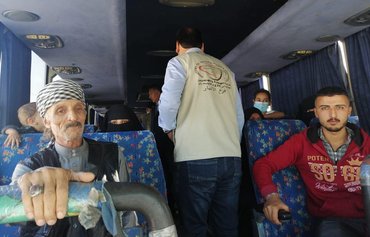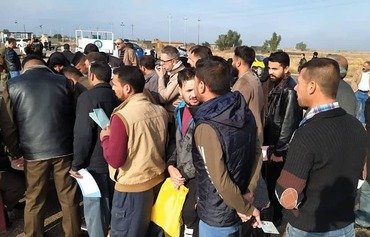Kirkuk authorities have been working to bring an end to the province's displacement crisis via a series of incentives that encourage the voluntary return of internally displaced persons (IDPs).
Over the past two years, the province's local authority has facilitated the return of nearly 80% of the population of al-Hawija district, Kirkuk media director Marwan al-Ani told Diyaruna.
The district has a total population of about 100,000, he said.
Residents also returned to smaller towns in al-Hawija, such as al-Zab, al-Abbasi, al-Riyadh, al-Rashad, he added, as well as parts of Daqouq and al-Dibis districts.
“As a result, we closed down three out of seven IDP camps, Laylan 1 and 2, as well as the Yahyawa camp, as these facilities are no longer needed following the return of its occupants to their homes," he said.
Security improvements
Efforts to return displaced families to their homes in Kirkuk province are progressing according to government guidelines and the national strategy for maintaining stability in all cities liberated from ISIS, al-Ani said.
“As a local government, we are fulfilling our obligations to rehabilitate public service sectors that were damaged by terrorism to create a favourable environment for the displaced population of Kirkuk," he said.
The restoration of infrastructure and services will enable the returning population to resettle in their hometowns and prevent any reverse migration trends towards the IDP camps, he said.
“We also are working with the security forces to provide full protection for liberated areas, because security is an important support factor for a normal life in any area," he added.
In addition to its own displaced population, Kirkuk also hosts thousands IDPs from nearby provinces, including Diyala, Salaheddine and Ninawa, al-Ani said.
"Their return is a top priority for the local government," he said.
Meanwhile, the Iraqi government has been exploring ways to facilitate the phased, voluntary return of displaced families through grants, compensation and other financial incentives that would help them to rebuild their homes.
Many hurdles remain
The effort to end Kirkuk's displacement crisis faces many hurdles, however, as dozens of villages and towns were completely destroyed under ISIS.
“There are 116 villages, in addition to the town centre of al-Multaqa, where everything was completely destroyed during the war on terrorism," said Kirkuk provincial council member Maan al-Hamdani.
This includes homes, farms and infrastructure, he said.
Around 70,000 people who hail from these villages are now living in displacement camps, he said, while others are living in temporary rental accommodation or with their relatives in Kirkuk.
The local government estimates it would need around $1 billion to rebuild these villages, he said, with funds allocated to new housing projects, infrastructure and services, including a water plant, electricity grid, schools and hospitals.
Kirkuk officials are currently holding meetings with international organisations and donor country representatives to discuss ways to support the province and help it cover reconstruction costs, he said.
Affected villages stretch across 180 kilometres, from the outskirts of al-Dibs district in north-western Kirkuk, to al-Douz district in the western part of the province, which has been emptied of inhabitants, he said.
"Most of the population are farmers who lost their livelihoods," he said, pointing out that they would benefit from assistance to help with farmland restoration and new agricultural projects.
Al-Hamdani said there are concerns that if the original residents do not return to these communities, ISIS remnants will establish a presence in these areas, which may become a launchpad for future attacks.
Food aid and support
The Ministry of Migration and Displacement is working to facilitate the voluntary return of all those forced to leave their homes during the ISIS incursion.
This includes all those who were displaced from Kirkuk province, said Ali Jahankir, director general of the ministry's branch affairs department.
“We are providing buses and logistical support for them so they can return home safely," he told Diyaruna.
"We are following up on their situation even after they have resettled, and are providing them with aid in the form of food and relief assistance as well as grants so they can get back on their feet," he said.
The effort to help IDPs return to their homes has been making headway in Kirkuk, where "there are large numbers of families who have been encouraged to return voluntarily to their homes and are now leading a normal life", he said.
“As for those who remain displaced, we are committed to providing them with all their basic needs and to standing by them until the conditions conducive to their return are created," Jahankir said.

![A convoy leaves displacement camp in Iraq to return to Kirkuk province's al-Hawija district on February 28th, 2018. [Photo courtesy of the Iraqi Ministry of Migration and Displacement]](/cnmi_di/images/2019/11/13/20819-Iraq-Hawija-camps-600_384.jpg)





